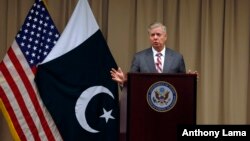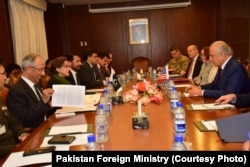An influential Unites States senator who is considered to be close to President Donald Trump cast doubts on reports that half of the United States troops in Afghanistan would be withdrawn soon.
“I’ve had no evidence that there’s been a number like that at all. I don’t believe that report’s accurate,” said Republican Senator Lindsey Graham Sunday in Islamabad, where he was talking to journalists during a trip to the country.
The New York Times reported in December that Trump had ordered the military to withdraw almost 7,000 troops from Afghanistan. The White House has not denied the reports. According to The Washington Post, former Secretary of Defense Jim Mattis resigned over disagreements with the president on troop withdrawal from Syria and Afghanistan.
The news of withdrawal sent shock waves in the region at a time when the Special Representative for Afghanistan Reconciliation Zalmay Khalilzad was trying hard to move negotiations with Taliban forward.
Khalilzad ended a four-day visit to Pakistan Sunday, after the Afghan Taliban seemingly refused to meet with the American team, despite reported efforts from host country Pakistan. Talks with the Taliban have dead-locked over the issue of involving the Kabul government in the negotiations. The Taliban call the Kabul regime a “puppet” of the Americans and have never accepted it as a legitimate government.
Graham reiterated the war in Afghanistan needs a political solution and suggested a meeting “sooner rather than later” between Trump and Pakistan’s Prime Minister Imran Khan to find a resolution to the Afghan conflict.
“I’m going urge him to meet with prime minister [Khan] as soon as practical. I think they will hit it off. Similar personalities,” Graham said.
Trust deficit
Graham also blamed Pakistani hesitance to fully cooperate with the Americans on the “terrible” trust deficit between the two countries.
“The day Pakistan sees us as a more reliable strategic partner, the day they’ll do more,” he said.
The United States has long complained Pakistan provides sanctuaries to the leadership of the Afghan Taliban, a charge Islamabad denies. It has also long claimed Islamabad could do more to bring the Taliban to the table for negotiations.
In recent months, several U.S. officials have indicated Pakistan appeared to be trying to help resolve the Afghan issue, but added they were cautious in their optimism due to what they called a history of duplicity.
Khalilzad’s tweet at the end of his trip credited Pakistan for pushing to resolve the Afghan conflict.
“We’re heading in the right direction with more steps by Pakistan coming that will lead to concrete results,” he tweeted.
Graham also seemed optimistic that things were improving, crediting the change to Pakistan military’s efforts to deal with the threat of terrorism, plans to integrate the lawless tribal areas into mainstream Pakistan, and a new prime minister in office that he thought could be a “partner” in a “beneficial relationship.”
“I don’t want to oversell, but it’s time to realize things have changed,” he said, adding that he would suggest to his colleagues in Congress to stop “stereotyping.”
Graham, who has been to Pakistan dozens of times, also said he saw the country as a “good market” for American products and wanted the relationship to move beyond security-related issues.
But on Sunday, he said, "Nancy, I am still thinking about the State of the Union speech, there are so many options - including doing it as per your written offer (made during the shutdown, security is no problem), and my written acceptance. While a contract is a contract, I’ll get back to you soon!"





